Like the Maldives, French Polynesia is heavily dependent on tourism. It had reopened to travellers, including Canadians, in the earlier stages of the pandemic until France temporarily closed the borders of all their overseas territories back in February 2021.
Best known for views of Mount Otemanu, the French territory’s crown jewel of Bora Bora is home to calm lagoons and luxurious overwater bungalows.
Pre-pandemic, it was a bucket list redemption for the most aspirational of points collectors, and this appears to remain true throughout the rest of 2021 and 2022 as Canadians look to embark on their first international trips abroad.
French Polynesia Travel Restrictions
French Polynesia resumed international flights and welcomed back foreign tourists as of May 2021, albeit with several travel restrictions in place.
They are technically open to all travellers; however, as we’ll see below, it is only practically open to countries that have access to a subset of the vaccines approved by the World Health Organization (WHO).
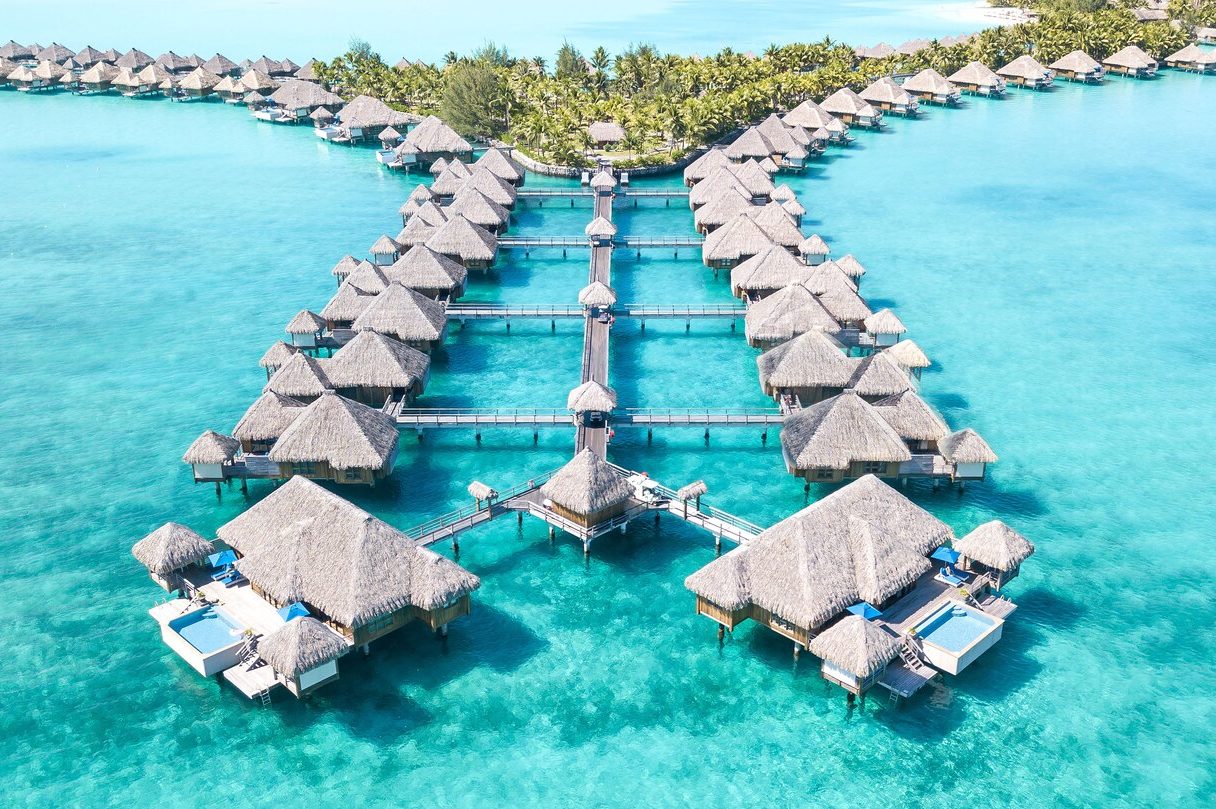
How Can Canadians Enter French Polynesia?
All Canadians are allowed to enter French Polynesia via a flight or a cruise. As of October 2021, when departing Canada by air, travellers are required to present proof of vaccination.
The following conditions must all be met in order to be permitted entry:
- Present proof of vaccination. The four accepted vaccines identical to the ones approved by the Public Health Agency of Canada (PHAC): Pfizer, Moderna, AstraZeneca, and Johnson & Johnson.
- There must be a waiting period of seven days after Pfizer, Moderna, and AstraZeneca and 28 days after Johnson & Johnson.
- Mixed vaccines are permitted as per Tahiti Tourism.
- For Canadians, the vaccination card from your provincial health authority will suffice.
- Present a negative COVID-19 test prior to departure. This can be a PCR test (RT-PCR, RT, RT-LAMP, TMA, STAR, Isothermal amplification) within 72 hours or an antigen test within 48 hours of departure.
- Antibody, self-testing, home testing, or rapid PCR tests such as the Abbott ID NOW are not accepted.
- Have stayed the last 15 days on French territory, in the United Kingdom, or in countries of the “green zone” prior to departure to French Polynesia.
-
- Canada and the U.S. are both listed in the green zone. The full list of permissible countries can found on the website of French Foreign Affairs.
- Fill out the sanitary entry form between 30 and 6 days prior to departure.
- One form must be filled out per traveller, including children.
- Fill out the sworn statement to abide by health and safety regulations throughout your stay in French Polynesia.
All travellers over the age of six will be required to take an antigen test upon arrival and children under eighteen will have take a self-test on Day 4 and Day 8 after arrival, to be handed in at your hotel. Children under eighteen may enter as long as their accompanying adults are vaccinated.
The full list of requirements and steps to follow are available on the French Polynesian government website. There is also a neat graphic available for download detailing all the required steps prior to and after arrival.
Travellers must also pay a health surveillance fee of 5,000 XPF ($62) per person for all those at least 6 years of age.
French Polynesia grants on-arrival entry visas of up to 90 days’ duration to visitors of most nationalities, including Canadians. To qualify for the visa on arrival, you must have a confirmed booking at a place of accommodation and a ticket for onward travel.
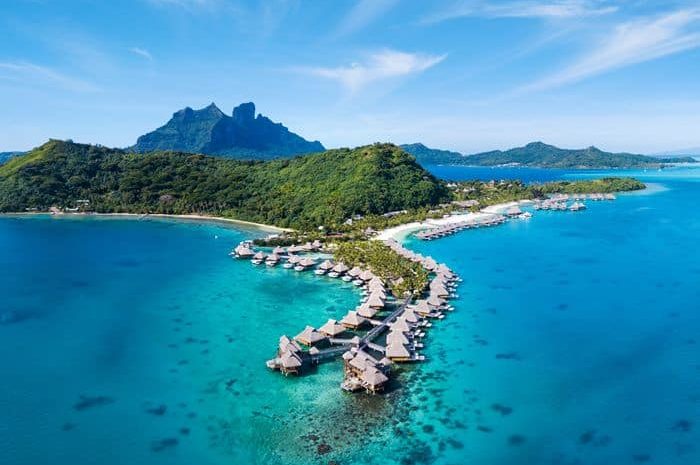
Testing & Quarantine Upon Arrival
A 10-day quarantine is mandatory for unvaccinated travellers. Unvaccinated individuals are only permitted to enter for compelling essential reasons, travel not amongst them.
If the arrival test is positive, travellers must complete a 10-day quarantine at their own expense, with tests on Day 4 and Day 8. This is done at a government chosen quarantine facility at a cost of US$60 per day.
It is possible to quarantine at a hotel or AirBnB, but the request must be submitted at least 72 hours prior to arrival, so this would not feasible for vaccinated tourists.
A downloadable quarantine guide is available for all visitors.
Testing & Quarantine Upon Return
As of April 1, 2022, a negative test is no longer required prior to travelling back to Canada.
If you need to find a test, this is fairly easy in French Polynesia, as PCR tests are provided on the main island of Tahiti at a cost of 5,700 XPF ($67) with results within a few hours. The full list of labs is available on the COVID-19 Travel Information for The Islands of Tahiti. Most resorts also offer COVID-19 testing directly.
Alternatively, consider purchasing a Switch Health RT-LAMP or antigen test kit for an easy remote testing option via telehealth video link.
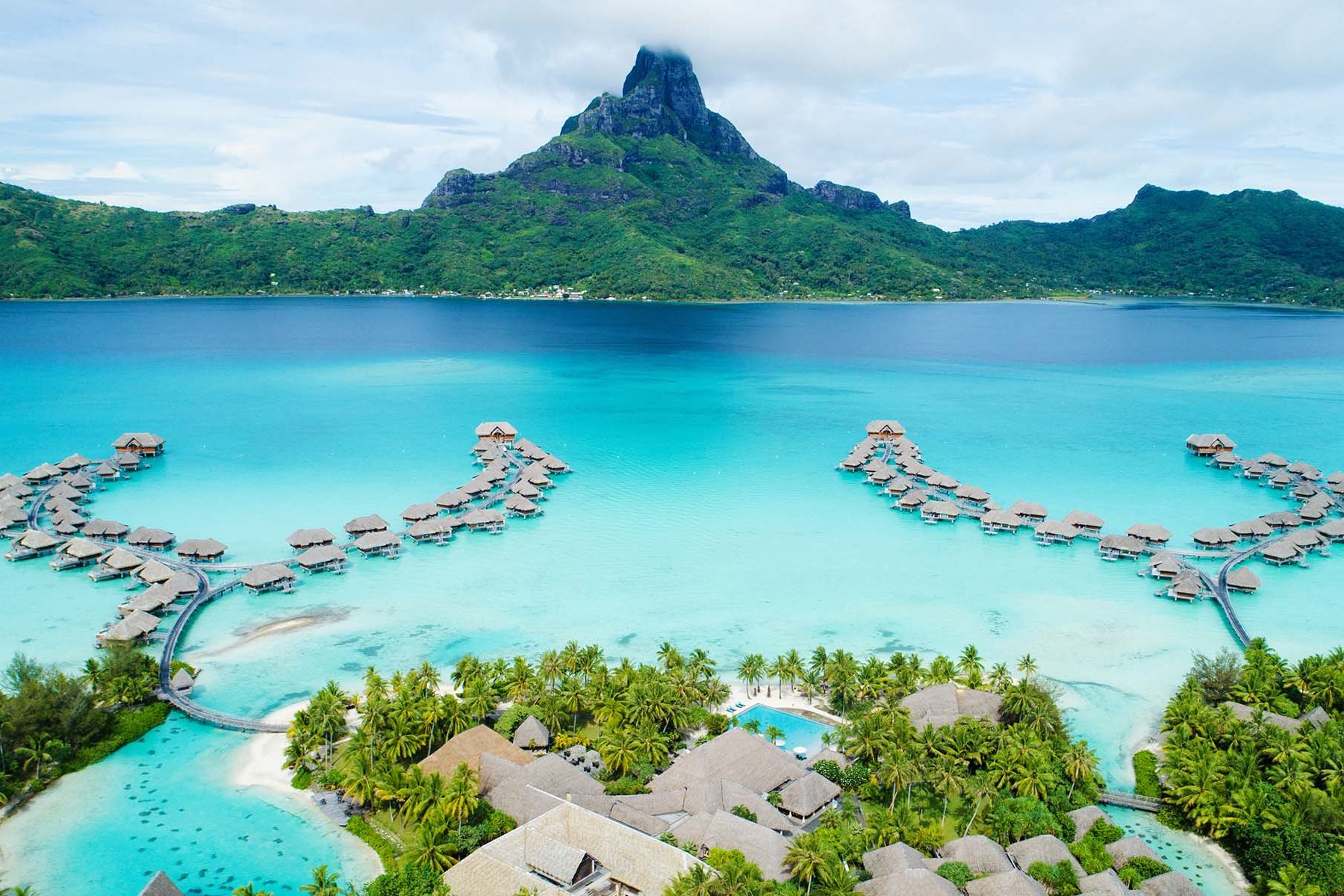
Current Health Requirements in French Polynesia
If you’re headed to Bora Bora, you’ll most likely be spending almost the entirety of your time at one of the many overwater resorts in the islands.
While there, it will more or less be a “normal” vacation, as social distancing is fairly easy when every guest has their own bungalow and the remainder of your time is likely to be spent outdoors.
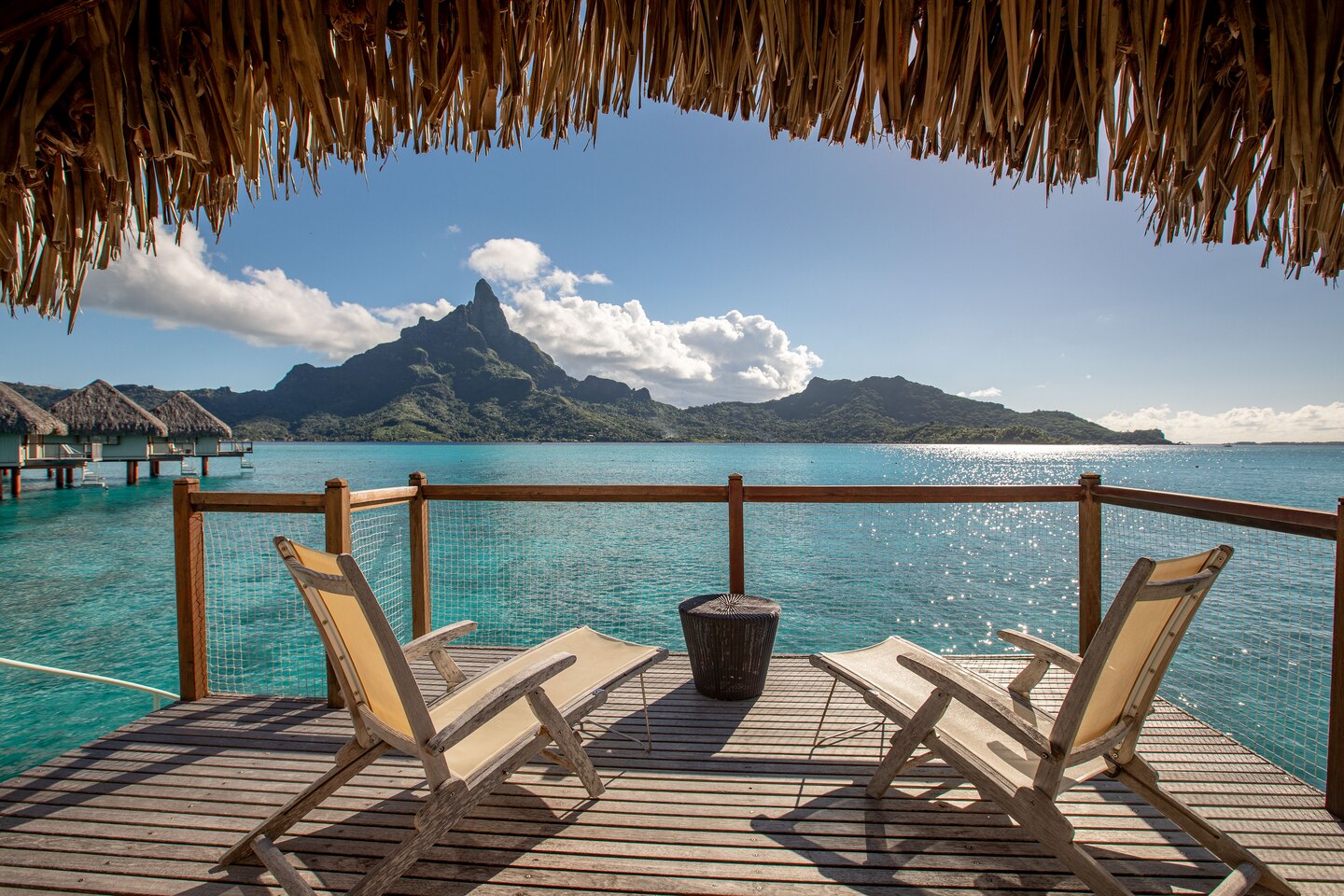
Splitting your time in French Polynesia across multiple resorts is allowed and is fairly simple to do so, as there are no testing or quarantine requirements for travelling between islands.
There remain a few travel restrictions, such as no sitting right next to the driver for any ground transport. These restrictions only appear in very specific capacities and are unlikely to significantly impact your trip.
Hostels, guesthouses, and other shared accommodation are all open with no capacity limits. In fact, the major restriction impacting all accommodation, from luxury to guesthouses, is the removal of buffets in favour of à la carte dining.
You’ll find all the details on health and safety procedures at the COVID-19 Travel Information for The Islands of Tahiti website.
Where to Stay in Bora Bora
Many of us have accumulated large volumes of rewards points over the past year that we might be itching to burn on a luxury stay. In the primary resort islands of Bora Bora, travellers are spoiled for choice, with an endless number of resorts to choose from.
Most major hotel chains do have a presence in Bora Bora, giving you a plethora of options to choose from when redeeming points.
Marriott Bonvoy resorts include the following:
- St. Regis Bora Bora: 70,000–100,000 points per night
- Le Méridien Bora Bora: 50,000–70,000 points per night
- Currently closed for renovations and not accepting reservations
There’s also the Conrad Bora Bora Resort, which costs 89,000 Hilton Honors points per night. At these resorts, you can also leverage Marriott and Hilton’s Fifth Night Free benefit to unlock maximum value for your points.
And you can also consider the following locations, although points redemptions are harder to come by:
Outside of Bora Bora, there’s the Hilton Moorea (30 minute ferry from Pape’ete), which costs 80,000 points per night, while the InterContinental Tahiti is the best option if you need to overnight in the capital before or after your trip.
Which resort you choose will depend on just how luxurious you’d like your experience to be, along with how many hotel points you’ve racked up. Award availability can be hard to come by, so I’d recommend checking often and booking as soon as something opens up that works for you.
Most standard rooms are not overwater bungalows, but you can always email the hotel in advance, suite talk your way to an elite status upgrade, or pay a nominal fee either in advance or upon arrival. Many Bora Bora-bound travellers consider it a “once-in-a-lifetime” trip, in which case saving up your points and splurging for an upgrade makes a lot of sense.
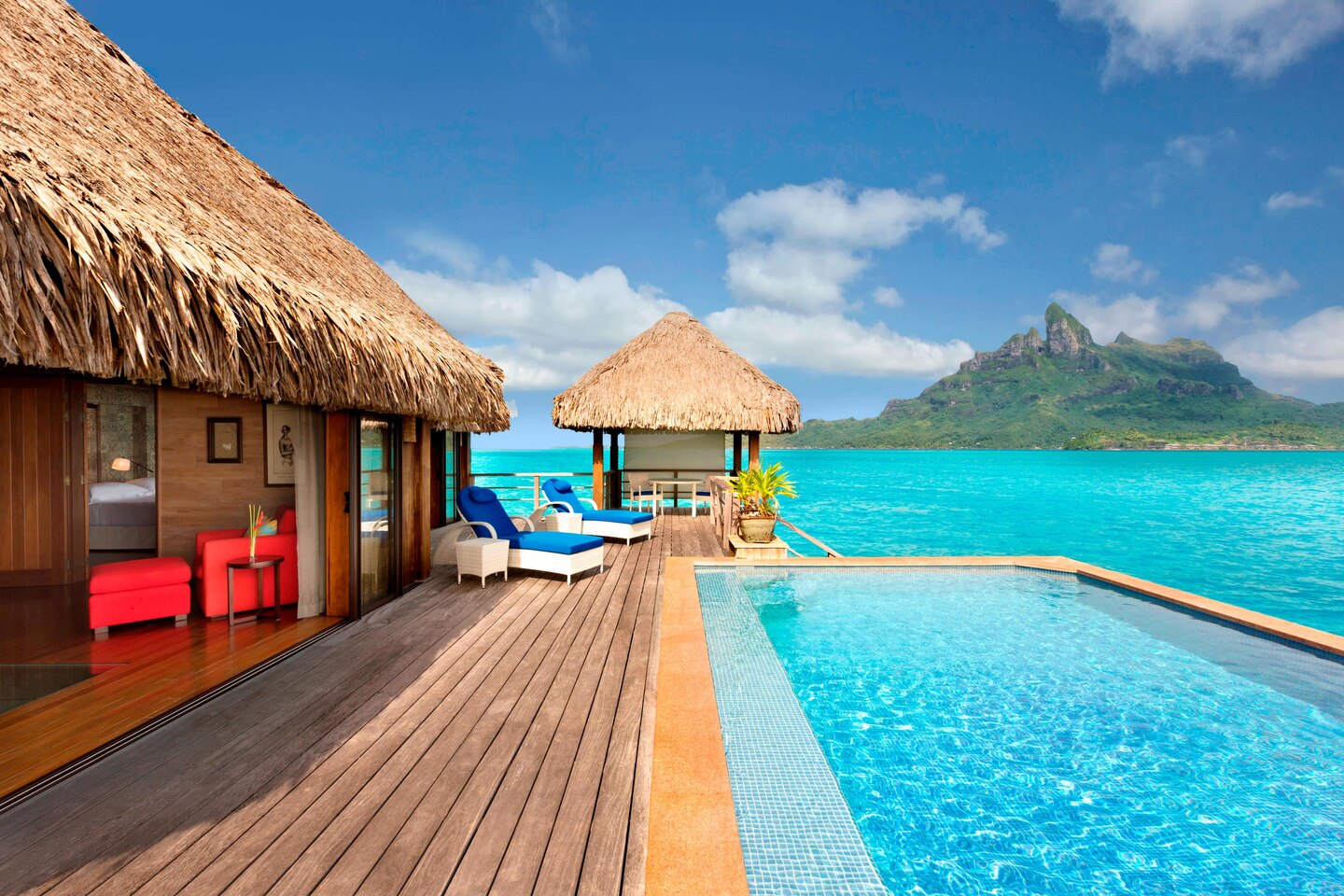
Keep in mind that even though your Bonvoy or Hilton points will go very far in terms of value, the overall trip is still likely to cost you a fair chunk of change.
Flights between Bora Bora and the capital of Tahiti run US$400 round-trip, and most resorts charge an additional boat transfer fee to the tune of US$100+ round-trip to Bora Bora Airport.
Having at least Marriott Platinum Elite status or Hilton Gold status will come in very handy, as the complimentary breakfast will help you save on the inflated cost of food and beverages at the property.
Most of the time, Bora Bora resorts will also offer a paid or complimentary shuttle to the main island village of Vaitape for local (i.e., cheaper) eats. You can also pick up snacks, soft drinks, and alcohol there.
Given the cost of flights between Tahiti and Bora Bora, you can purchase a few different types of multi-island passes for marginally more (~US$100) and visit some of French Polyensia’s other islands in order to make the most of your trip.
How to Get to French Polynesia
While it’s possible to buy or redeem points for flights to French Polynesia in economy class, I imagine most travellers will have their eyes on a premium cabin redemption for such a special trip.
Unfortunately, premium cabin redemptions are very difficult to come by (significantly harder than the Maldives), and I recommend you plan far ahead and jump on any award space that you find.
Using Aeroplan points, you can book on United Airlines from San Francisco for a cost of 55,000 points one-way from the West Coast or 75,000 points one-way from the East Coast. East Coast residents can save a few points by booking a separate economy class redemption to Vancouver to start the trip.
Availability is sparse on this route, but there are occasionally pockets available either far out or close in.
Another option is to use Flying Blue miles to book Air France business class departing from Los Angeles. This costs between 64,000–74,500 Flying Blue miles one-way due to the dynamic nature of Flying Blue.
Again, availability departing from Los Angeles is extremely scarce, while availability in the opposite direction is sporadic.
American Express US Membership Rewards, Chase Ultimate Rewards, and Citi ThankYou all transfer to Flying Blue at a ratio of 1:1, while Capital One points transfer at a ratio of 1:1.5.
Marriott Bonvoy points also transfer at a 3:1 ratio, with an extra bonus incurred of 5,000 miles when transferring in increments of 60,000 points.
A final option is to book Air Tahiti Nui departing from Los Angeles, using 80,000 American AAdvantage miles one-way in business class.
Award space is rare, especially for more than one passenger. On the bright side, American Airlines has a very useful calendar view, so we can peruse quickly.
For price-conscious travellers or those unable to find award space, French Bee is a low-cost airline operating flights from San Francisco for as low as US$200 one-way.
Given the nature of the airline, expect to pay for extras such as seat selection and checked bags. A basic meal service is served, but I wouldn’t expect anything too fancy.
You can choose to book premium economy for a few hundred more dollars, which include a 2-3-2 rather than 3-4-3 configuration, as well as wider seats and more pitch. Funnily enough, premium economy seats on French Bee are still narrower than coach seats on most mainline carriers.
From Tahiti, you can book round-trip tickets to Bora Bora directly from Air Tahiti (a different airline from Air Tahiti Nui) or via a third-party booking agency. This could be a good opportunity to apply fixed-value points currencies such as TD Rewards, CIBC Aventura, and Scotia Rewards points.
Conclusion
French Polynesia is about as “normal” of a vacation as possible these days, given the lack of travel restrictions once you enter the country.
Many luxury resorts have closed for many months throughout the COVID-19 pandemic; however, they are now reporting nearly full capacities this summer. Clearly, “revenge travel” is in season.
While award space on flights and resorts are difficult to come by, I think the payoff will be more than worth the effort required in the way of dramatic volcano views, endless turquoise water, and your own overwater bungalow.
The travel requirements for going and returning are extensive, so be sure to pay extra attention to all the details.
As always, you can refer to our Travel During COVID-19 Resource for Canadians for the most up-to-date information on travelling in the pandemic era.





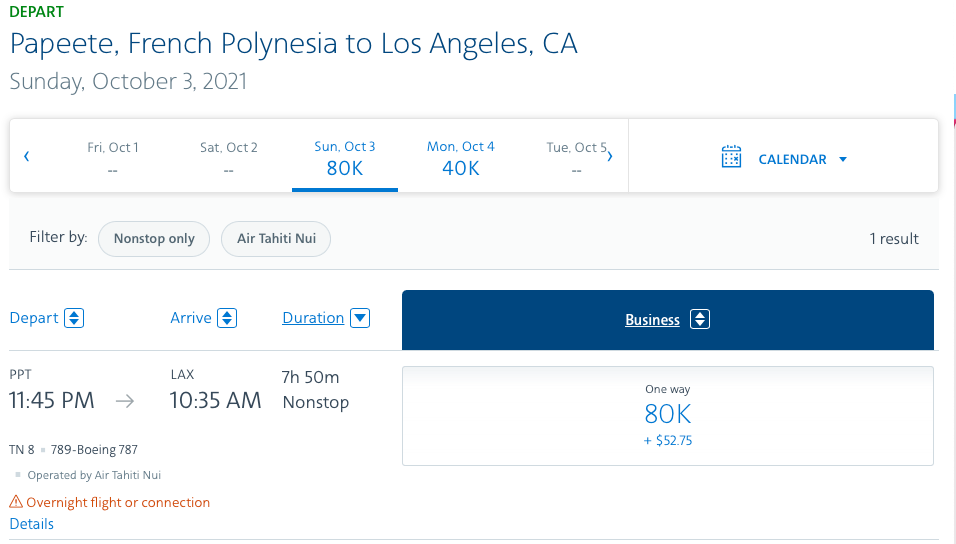
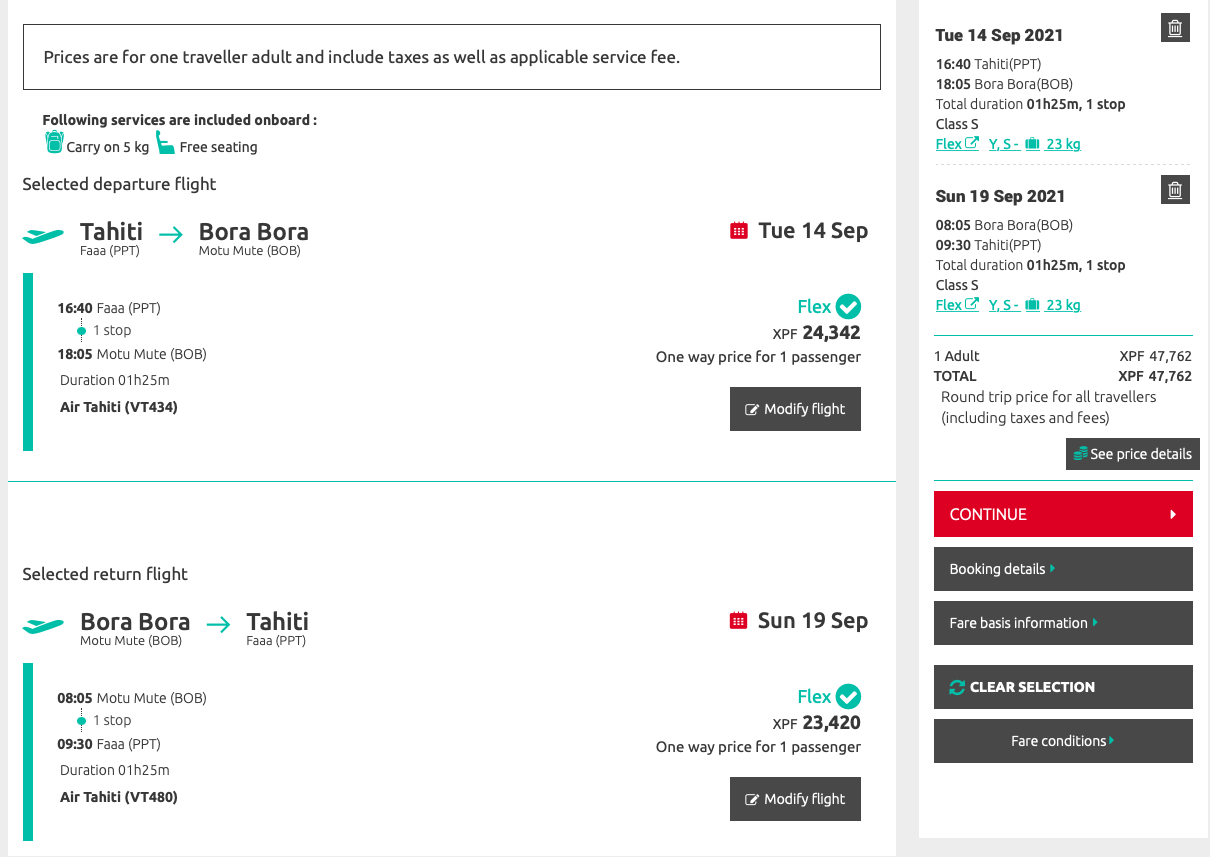













“PCR test (RT-PCR, RT, RT-LAMP, TMA, STAR, Isothermal amplification)”
Why are there so many different PCR tests? Why isn’t there a worldwide standard?
Hey Crew! It’s so nice to start dreaming again and FP is up there for a grand venture. If you’ve never been I would encourage a consideration to the Pensiones. Smaller and more a beach hut approach but most have a meal plan so you don’t have to “stock up” with the free BF. They may not be overwater but a more authentic experience in a smaller atoll is hard to find. Air Tahiti has some accommodation recommendations which are great. I’ve stayed at many a pricey OW bungalow (even at the lovely Four Seasons in Bora Bora) and preferred the smaller pensions at remote atolls. One word of caution is make sure prior to the flight out you fly from an atoll that has the testing capabilities as it may be difficult to organize from a remote atoll. Something I wouldn’t have done in the past but now a necessary change.
Thanks for your valuable input as always, I’m definitely hoping to do some side-trips to other islands in addition to Bora Bora when I’m able to snag those highly-coveted award seats out to Tahiti.
Do you have to quarantine until the test IN Tahiti comes back negative?
Make sure you at least pay for your seat assignment on French Bee. Wife and I cheaped out and decided to let them assign our seats and ended up in the middle of the 4 seat middle row with a person on either side. Made an uncomfortable flight even more uncomfortable.
Best solution is to avoid French Bee altogether. If paying cash, can typically find UA fares quite competitive to BF.